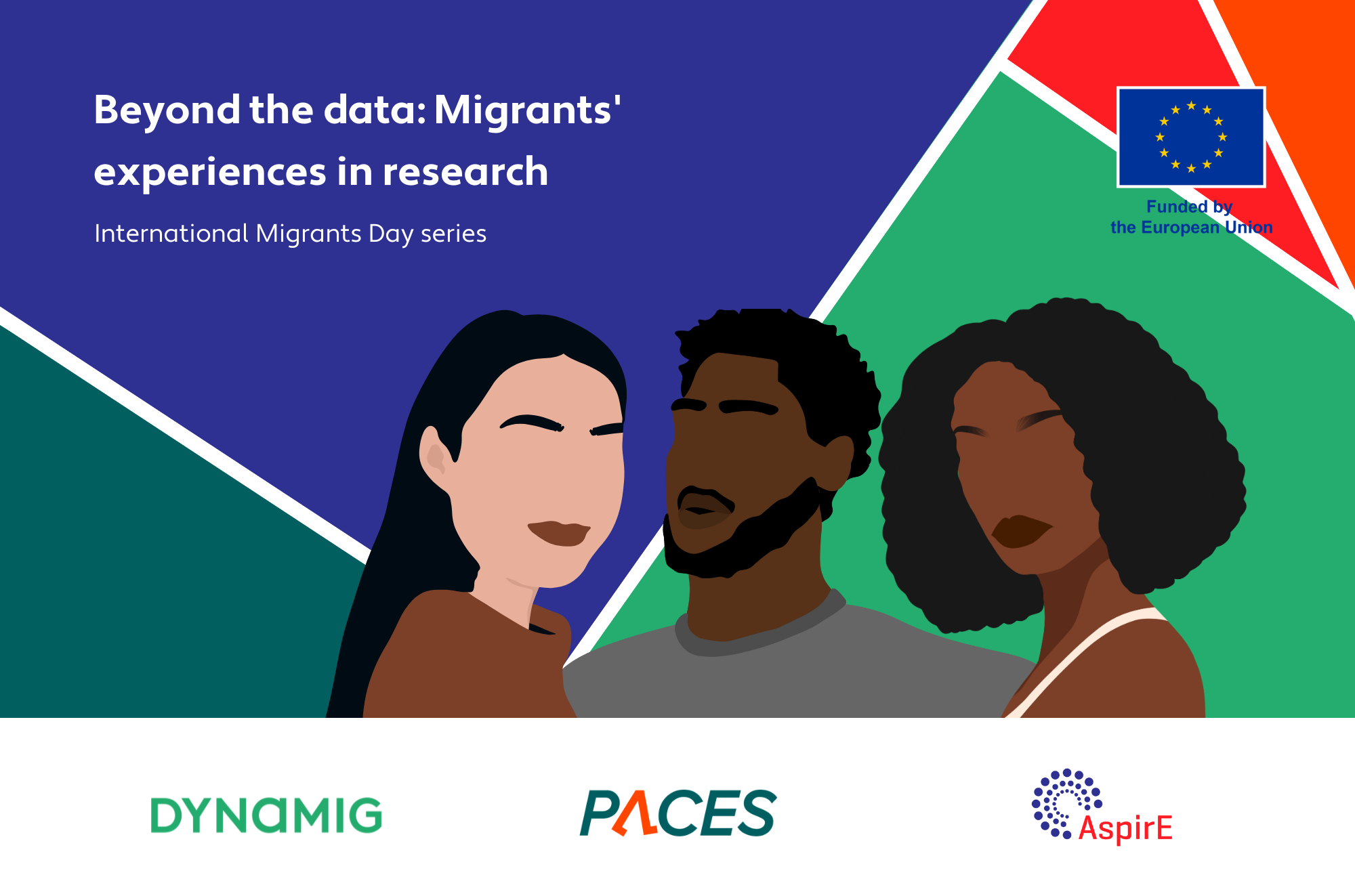News
Beyond the data: Migrants’ experiences in research – Part 2
18 December 2024

On International Migrants Day, AspirE, DYNAMIG and PACES – three EU-funded projects on migration decision-making – want to honour and reflect on the voices of migrants in migration research. In this three-part interview series, we focus on how (aspiring) migrants experienced their participation in our research. Through their reflections, we aim to shed light on the human side of academic studies, exploring what it means to share one’s story.

→ Read ‘Part 1: Interview with Abel' on the PACES website.
→ Read ‘Part 3: Interview with Felicity' on the DYNAMIG website.
Part 2: Interview with Flor
In the interview, we spoke to Flor*, a woman from Southeast Asia living in Europe and asked several questions (Q) about her participation in the AspirE project.
Q: What was your motivation to participate in the project?
Flor: As I have just recently graduated, I would like to contribute to the academic work myself as well because when I was doing my thesis, I know the struggle of finding interviewees and participants. This is one of the reasons why I participated in this because I see the importance of academic work and that it can also, in a way, have inference or impact on policymaking in the future, especially [as it is] under the European Commission research project. So I would like to reflect on my experience […] through the project so that it can be useful material for researchers to analyse, not specifically my case, but the overview of migrants’ life and so on: not only the reason why they come, not only the current situation or difficulties they are facing, but also the future prospects of how they see themselves, where do they see themselves, and what the plan is for them to be able to survive and contribute to this society, to reconnect again with their previous society in the hometown. As a migrant myself, I see the importance of this topic, so I think that participating in this project and my motivation for this is basically to contribute so that migrant people like me and our voice[s] are reflected in the research work and so that the policymaking of the EU and other Member States are more taking into account our aspirations.
Q: How did you feel when you were sharing your migration story within the context of AspirE?
Flor: I think that the questions asked during the interview […] made me realise what I have [where I live]. During the interview, I felt that I could finally find someone who understands and who is interested in my life, even though I wouldn’t be interested in anyone’s life like that. The fact that there are other people who are interested in my aspirations, my life, my path… It made me feel good. It is good that someone listens to me, that they know my struggles, that they make my voice heard. [...] In the same way, I feel good that I can help them do their job and their research.
Q: Has participating in the project changed the way you think about migration and your own journey?
Flor: I left my stability, my security, my family, my country… I left everything that I used to know. I left the society that was designed for a person like me to go the furthest. That society fit me very well [even though] where I am from, there is age discrimination in the professional career. I decided to come here. Participating in this project made me reflect on myself, on what is my prospects, and my path of being a migrant here. It made me reflect a lot.
Within AspirE’s [data collection] activities, I had to reply to the same questions over a period of time. But I think that if my situation doesn’t change, I will give the same answers as the previous one. If the project was longer, it would be more interesting, but then you need to find participants that are really committed, which is an obstacle. I would like to add that in the academic work in the EU, they are more focused on Europe and Africa. I see the difficulties of having research on Asia perspectives. Some fields have been ignored in European institutions and academic work. And also, when Europeans talk about Asians, they think of Japan, China, and that is it. But we also have Southeast Asia, Central Asia, and South Asia.
Q: How do you think this type of research should be conducted?
Flor: I think that doing research on a broad population is good, but at the same time, I think that the work has to be deep enough for each type of population. This is the difficulty, but it is also more interesting, as we can analyse many aspects and populations. Both have advantages and disadvantages. For me, I would go for more variety, but then it has to be deep enough.
Q: What sorts of outcomes do you expect from this research type?
Flor: I imagine after the results are published and after policymakers and politicians if they ever read the results, the minimum I expect is for them to know that we exist in society. But if I think further about the impact, I hope that there will be more fair policies towards migrants and to have more support, state support, state help, EU help, support to help migrants safely and securely in the society because I have to say that actually, migrants are not just parasites. I want them to see us as resources. It is important to think of the reasons behind the narratives of seeing migrants as parasites.
Every person is a driving resource of the society where they live, including migrants. Being here is already difficult, so this has to be taken into account, and this is what I hope will be an outcome of the project.
*The interviewee’s real name has been modified, and any identifying or location markers were removed, altered or generalised to protect their privacy. Ethics procedures were followed throughout the interview series, with approval from the interviewees and guidance and/or approval from the project managers, researchers, independent ethics advisors and data protection officers of the three projects. The interview was edited for length and clarity, while preserving as much of the original phrasing as possible.